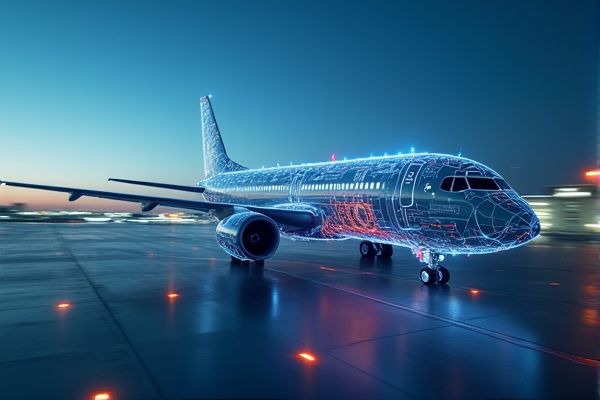
AI enhances operational efficiency in the airline industry by optimizing flight schedules, streamlining maintenance processes, and improving route planning. Predictive analytics allows airlines to forecast demand, enabling better pricing strategies and capacity management. Chatbots and virtual assistants provide customer support, handling inquiries and bookings, which improves passenger experience while reducing operational costs. Real-time data analysis aids in safety management, allowing for proactive maintenance of aircraft and minimizing delays.
AI usage in airlines industry
Predictive Maintenance
Predictive maintenance in the airline industry can enhance aircraft reliability and reduce downtime. By utilizing AI algorithms, airlines can analyze performance data to anticipate potential failures before they occur. For example, a major airline like Delta can implement these strategies to optimize maintenance schedules and improve operational efficiency. This proactive approach may lead to significant cost savings and increased customer satisfaction.
Flight Scheduling Optimization
AI can significantly enhance flight scheduling optimization in the airline industry by analyzing various factors like weather patterns, passenger demand, and aircraft availability. For example, airlines like Delta Air Lines leverage AI systems to improve the efficiency of their flight schedules, potentially reducing delays and operational costs. The algorithms used can predict the most profitable routes, leading to increased revenue opportunities. Such advancements can also enhance customer satisfaction by providing timely flights and improved service reliability.
Dynamic Pricing Models
Dynamic pricing models in the airline industry can optimize ticket prices based on various factors such as demand, competition, and customer behavior. Implementing AI algorithms can analyze real-time data, allowing airlines to adjust prices to maximize revenue potential. For example, Southwest Airlines could benefit from using AI to forecast demand and set competitive fares. This approach increases the likelihood of higher occupancy rates and improved profitability for airlines.
Customer Experience Enhancement
AI usage in the airline industry can significantly enhance customer experience by personalizing services and streamlining operations. For instance, chatbots can provide immediate assistance to travelers, reducing wait times for customer support. AI algorithms can analyze passenger data to offer tailored flight recommendations and discounts, increasing customer satisfaction. Implementing AI-driven solutions may also lead to operational efficiencies, allowing airlines to improve service delivery while minimizing costs.
Baggage Handling Automation
Baggage handling automation in the airline industry offers potential enhancements in efficiency and accuracy. Automated systems can reduce the chances of lost luggage, improving customer satisfaction at airports like Heathrow. Implementing AI technologies may streamline operations, allowing for quicker turnaround times. The possibility of reduced labor costs presents an attractive advantage for airlines looking to optimize their services.
Fuel Efficiency Analytics
AI usage in the airline industry for fuel efficiency analytics can lead to significant cost savings. By leveraging data from flight operations, airlines can optimize routes and reduce fuel consumption. For example, companies like Delta Airlines employ machine learning models to predict fuel needs based on weather patterns and flight paths. This strategic application of AI not only enhances operational efficiency but also supports sustainability efforts within the sector.
Air Traffic Control Systems
AI integration in airlines can enhance operational efficiency by optimizing flight schedules and reducing delays. For instance, Air Traffic Control Systems can utilize AI algorithms to predict congestion and automate routing, leading to smoother air traffic management. This technology presents the possibility of decreasing fuel consumption and emissions through more efficient flight paths. Airlines adopting such innovative tools may find a competitive advantage in improving customer satisfaction and lowering operational costs.
In-flight Safety Monitoring
AI can enhance in-flight safety monitoring by analyzing data from sensors and cameras to detect potential hazards in real time. For instance, AI systems can monitor passenger behavior and alert crew members to unusual activity, fostering a safer environment. Airlines like Delta Air Lines are exploring AI applications to streamline safety protocols and improve overall operational efficiency. The integration of AI technologies could lead to more informed decision-making, ultimately enhancing passenger safety.
Route Optimization
AI can significantly enhance route optimization in the airlines industry by analyzing vast amounts of data to identify the most efficient flight paths. Airlines like Delta Air Lines can benefit from reduced fuel consumption and lower operational costs through AI-driven algorithms. Such optimization also has the potential to improve passenger satisfaction by minimizing delays and enhancing overall travel experience. With the growing importance of sustainability, efficient routing could contribute to greater reductions in carbon emissions for the industry.
Demand Forecasting
AI usage in the airline industry for demand forecasting can significantly enhance operational efficiency. By analyzing historical flight data, airlines like Delta can predict passenger trends and optimize pricing strategies accordingly. Such advanced analytics may lead to improved flight scheduling and better resource allocation, ultimately maximizing revenue. This approach also allows for a more responsive adjustment to market changes, increasing the likelihood of filling available seats.
 techknowy.com
techknowy.com